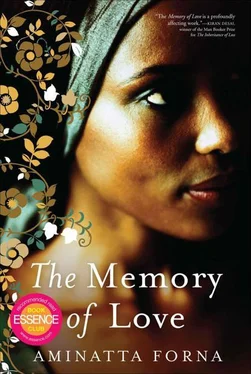During emergencies he is rushed, spinning on adrenalin, into the maze, racing down the paths, left and right, trusting his judgement to avoid the dead ends and wrong turnings, searching for those pinpoints of light. Now the hospital has money, some at any rate. The buildings have been renovated, there are doctors on sabbatical from overseas.
Today a letter from Tejani. Kai slips it from his back pocket and smoothes out the creases over his knee. In the computer age, they stick to this old-world form of correspondence. Tejani, he assumes, has a computer at home. But for him it means a trek into town to an Internet café, the long wait for a connection, the ponderous typing of his message — his fingers never having acquired the agility over the keys they possess when handling medical instruments — only to lose it when the server crashes or the electricity cuts out. The blue aerogramme bears a date some two weeks prior. The postal services are erratic, yet this is how they both seem to prefer it.
The anaesthetist puts her head around the door.
‘Ready when you are.’
‘Coming.’ Kai places the letter on top of his clothes, closes the locker door and follows her out.
First thing in the day they deal with the scheduled operations, then perhaps an elective and then whatever emergency has brought in. Keeping busy is the one way he knows to keep things under control. When he is not operating he writes up his notes meticulously and drinks coffee, or volunteers to help in the second theatre where a surgeon is often working alone. Other times he writes to Tejani, details of the procedures he has carried out. He has few friends among the staff. The African staff, who comprise almost all the nurses but only a few of the doctors, all have homes and families. The Western staff live and socialise in their own cliques, arranged by language mostly, sometimes age or ethnicity. Generally they stay only a few months and in that time Kai will extract from them whatever threads of knowledge he can: the Scottish expert in pain who demonstrated how patients felt phantom pains in limbs they no longer possessed, the plastic surgeons who arrived in teams of four and worked around the clock for two weeks, the eye surgeon who rotated between the hospitals in the city and upcountry and who set a stopwatch for each operation to remove cataracts and liked to joke, to relax his patients, that he could perform with his own eyes shut.
And when, finally, Kai can extend his day no longer he will pass outside the staff room, where the doctors gather at the end of the afternoon, and head to the empty apartment, which few know exists. He will lie on the sofa, hating the prospect of sleep, checking the luminous numerals of his watch and counting off the hours of darkness. Sleep, when it comes, arrives in flights, accompanied by a rush of images or sometimes lingering dreams. He wakes, often, bathed in sweat. In the morning he stands beneath the shower waiting to feel restored, then he begins to work again.
Inside the theatre they are ready to start, but for the fly. Now hovering above the lights, now perched upon the window frame. A masked nurse flicks at it with a cloth. Some joker has posted a sign on the OR door: No Fly Zone . Kai waits while efforts are made to remove the insect. On the shelves are stacked bottles of saline solution, rolls of cotton, catheters, IV lines, braided silk, needles, polyester suture and boxes of gloves. Unimaginable a few years ago. He thinks of Tejani.
Once, as students, they travelled together to a town upcountry to find a doctor of whom they had heard, who was conducting research into Lassa fever. The man and his work had achieved a mythological status among the student body. The fever affected populations only in rural parts of West Africa, peasants and farmers. No drug companies had ever funded programmes into its cure, though the virus, which was carried in rats’ urine, had been identified in 1969. The infection started with a headache, ended in death, blood pouring from the body orifices. Some claimed the doctor had a world-class reputation. Others that he didn’t exist. They’d hitched up one Saturday morning, Tejani and Kai, chased by the momentum of a late-night drinking session, and a handshake bet. Neither had travelled outside the city for several years, and neither could tell if the other was serious. The roads were appalling, nervous truck drivers insisted by then on travelling in convoy. They arrived after darkness. In the town they searched for a bar in which to relieve their hangovers, the edge of the thrill already blunted, their minds turned to getting back for Monday lectures. Two soldiers, stepping out of the black, asked to see their papers and what their business was in town. Tejani had spoken for both of them, as was the way in their friendship. He was honest, he told the soldiers they were students, of the doctor for whom they had come. There was nowhere in the world where doctors weren’t cherished. The soldiers had led them to him.
They found the doctor still at work, late into the night beneath a lone, insect-spotted, forty-watt bulb. He worked with a single assistant. Tejani and Kai waited in silence until he was ready for them. A small man, who seemed uncomfortable in his skin and baffled by their visit, though gracious enough. Kai remembered seeing a picture of him some time later, at an awards ceremony for his work, wearing an outsize suit and the same expression of bafflement, surrounded by European faces. Two images of him: that one, which came later, and the first, of him working on the other side of the room, handling samples of contaminated matter, wearing a snorkel and mask, and a pair of household rubber gloves.
In those days they had learned to make do. Throughout the whole of their medical training, it had been the same. One would perform a procedure, the others watch. It has become part of him, this lack of need. And there is always a fly. So they decide to proceed, as they always do. Time in the operating theatre is marked out in precious minutes.
The amputation patient is lying on the table, arms outstretched, one arm hooked up to the blood-pressure monitor, the other to a line into which the nurse is pumping ketamine. He is strapped to the table to prevent him moving should he begin to hallucinate. Kai has seen a patient try to stand up in the middle of a procedure, heard another talk to his dead mother. Tejani had written to him of nightclubs in America where people lay in darkened rooms, knocked out on ketamine. During the war commanders had given the drug to child combatants just before they sent them into battle.
In this most recent letter, Kai thinks he detects a new mood of confidence. Tejani’s letters of the first two years have been full of laments. It has been Kai’s job to reassure him. Now, for the first time, something different. Come, Tejani is saying to his old friend. Come . The word acts upon him all day, making him restless, like a grain of sand between skin and shirt.
Kai swabs the area where the first incision will be made with a mixture of water, iodine and ampicillin.
Seligmann, the Canadian surgeon whom Kai is assisting, is ready to begin.
‘Cutting now.’
Kai closes his eyes and opens them. He breathes in, lets all the sounds behind him fall away, all except the voices of the team and the sound of the instruments.
A photograph.
‘I had Babagaleh bring this in. I hadn’t seen it myself for years. It was among the things we were packing up a few weeks ago.’
The garden, a vast sweep of foliage, seems to merge with the sky, heavy black-and-white clouds, brightened by a glint of silver, like far-off lightning. By contrast, beneath his hat the face of the man in the pale suit is shadowed. Adrian can see, though, that it is Elias Cole. Elias Cole thirty years ago.
Читать дальше












